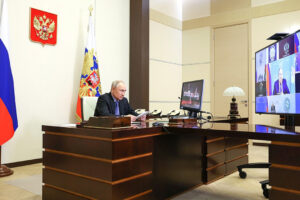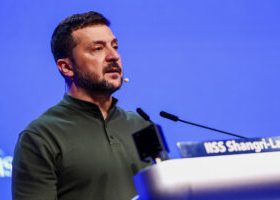RUSSIAN PRESIDENT Vladimir Putin held via videoconference a briefing with permanent members of the Security Council on Feb. 13.
WASHINGTON — The United States has told Congress and allies in Europe about new intelligence related to Russian nuclear capabilities that could pose an international threat, a source briefed on the matter told Reuters on Wednesday.
The new capabilities, related to Russian attempts to develop a space-based weapon, do not pose an urgent threat to the United States, the source said.
The intelligence came to light after Representative Mike Turner, Republican chair of the US House of Representatives intelligence committee, issued an unusual and cryptic statement on Wednesday warning of a “serious national security threat.”
Sources later said the warning was related to Russian capabilities in space, related to satellites. One of the sources said the issue is serious, but is not related to an active capability nor should it be a cause for panic. “I am requesting that President Biden declassify all information relating to this threat so that Congress, the Administration, and our allies can openly discuss the actions necessary to respond to this threat,” Mr. Turner said in the statement, providing no further information.
Citing a current and a former US official, the New York Times reported earlier that the new intelligence was related to Russia’s attempts to develop a space-based anti-satellite nuclear weapon. ABC News reported earlier that the intelligence had to do with such a capability. Current and former officials said the nuclear weapon was not in orbit.
Mr. Turner’s statement was released in the midst of debate in Congress over how the United States should be dealing with global threats from Russia and other rivals, with security hawks urging greater global involvement and some lawmakers most closely allied with Republican former President Donald Trump advocating for a more isolationist “America First” approach to world affairs.
Mr. Turner recently returned from leading a bipartisan congressional delegation to Ukraine, after which he warned fellow lawmakers that time was running out for Ukraine in its fight against Russian invaders.
The Biden administration has been ramping up its criticism of House Republicans for possibly blocking a $95-billion bill passed by the Senate that would supply aid to Ukraine, Israel and Taiwan. Supporters of the bill argue that a major reason for the United States to back the government in Kyiv is to push back against threats from Russia that extend beyond Ukraine.
‘NOT A CAUSE FOR PANIC’
House Speaker Mike Johnson, a staunch Trump ally who says he will not rush to allow a vote on the Senate bill, told reporters at the Capitol there was no need for public alarm. “Steady hands are at the wheel. We’re working on it and there’s no need for alarm,” he said.
Senators Mark Warner and Marco Rubio, the Democratic chair and Republican vice chair, respectively, of the Senate Intelligence Committee, issued a joint statement saying their panel has the intelligence in question and has been “rigorously” tracking the issue.
A source familiar with the matter said Mr. Warner and Mr. Rubio had been briefed on the threat weeks ago. The source said the issue was not unrelated to the security spending bill, but there is no direct tie between them.
Representative Jim Himes, the top Democrat on the House intelligence panel, said the issue in Turner’s statement is significant, “but it is not a cause for panic.”
Jake Sullivan, President Joseph R. Biden’s national security adviser, declined to provide specifics. He said he had arranged a briefing for Thursday with congressional leaders with administration intelligence and defense professionals, and that he was surprised by Mr. Turner’s decision to issue the statement.
“I’m not in a position to say anything further today,” Mr. Sullivan told a briefing. “Like I said, I look forward to the discussion with (Mr. Turner) and obviously from there we will determine how to proceed, but standing here at the podium today I can’t share anything further.” — Reuters






